牛津深圳版七年级上册英语Unit 2 Daily life Reading-最新(共57张PPT)
文档属性
| 名称 | 牛津深圳版七年级上册英语Unit 2 Daily life Reading-最新(共57张PPT) |  | |
| 格式 | zip | ||
| 文件大小 | 9.8MB | ||
| 资源类型 | 教案 | ||
| 版本资源 | 牛津深圳版 | ||
| 科目 | 英语 | ||
| 更新时间 | 2022-09-08 11:05:07 | ||
图片预览

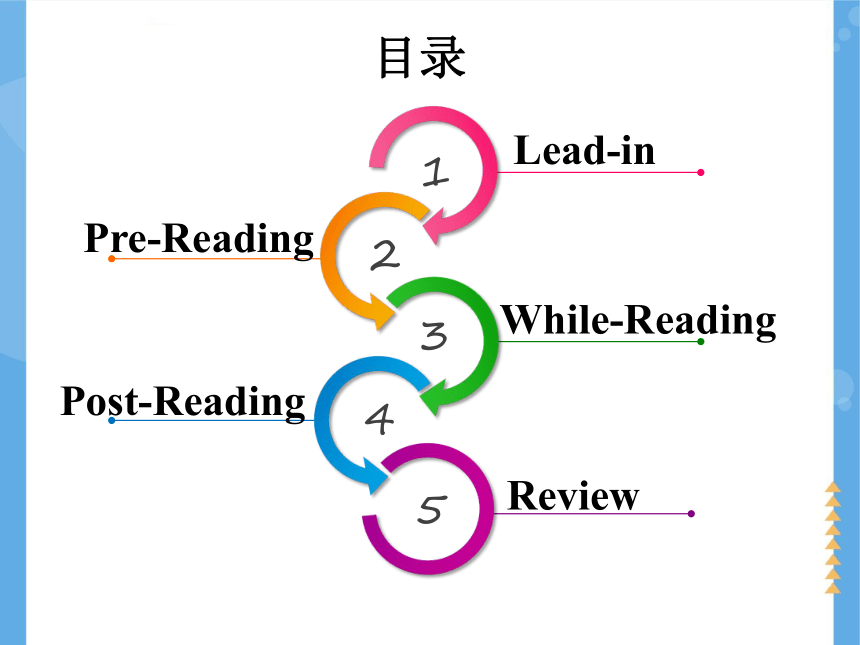
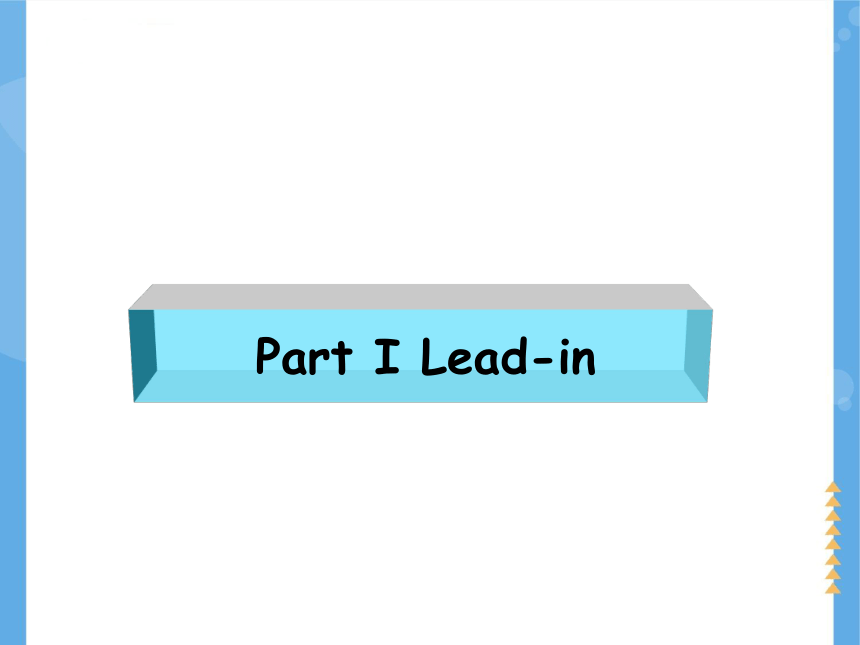
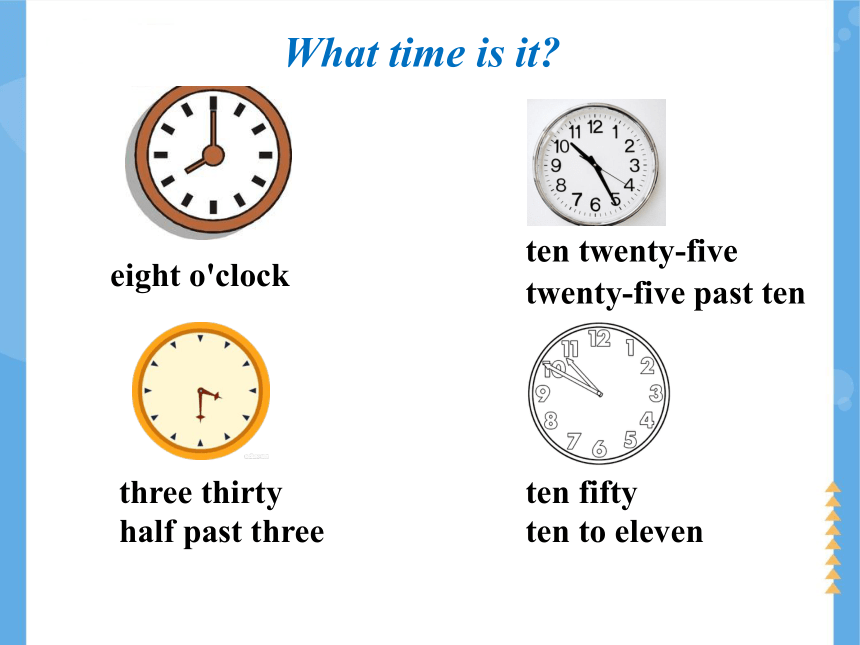
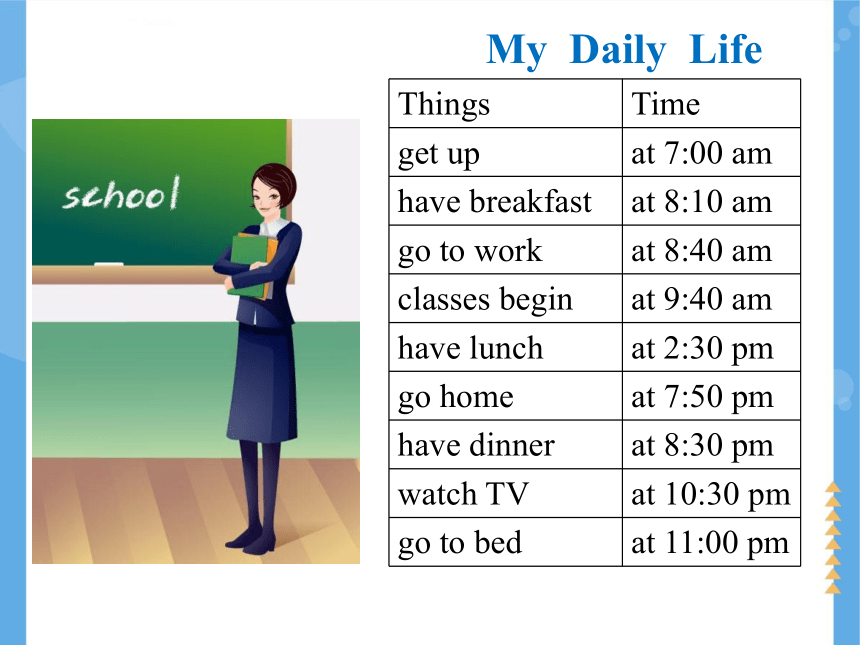
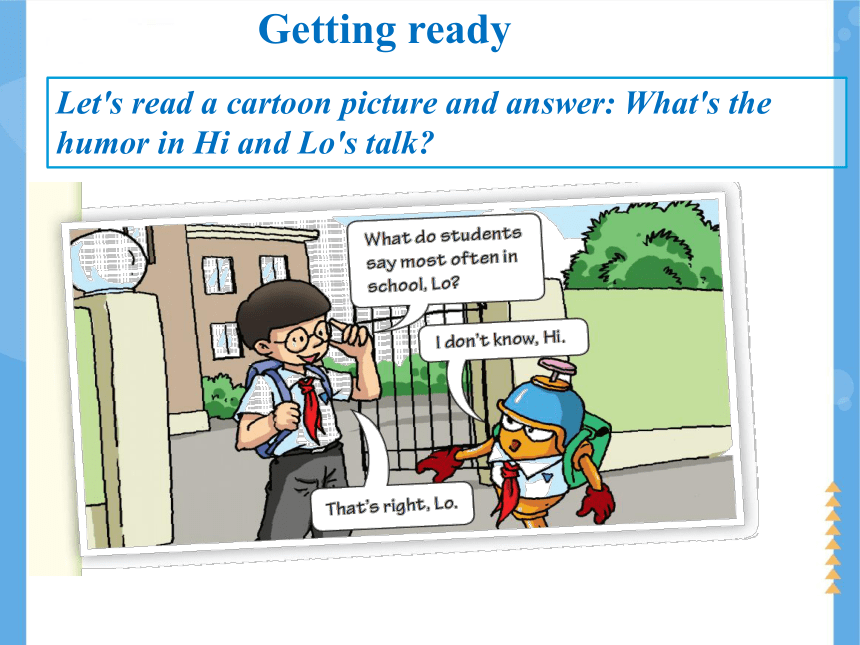
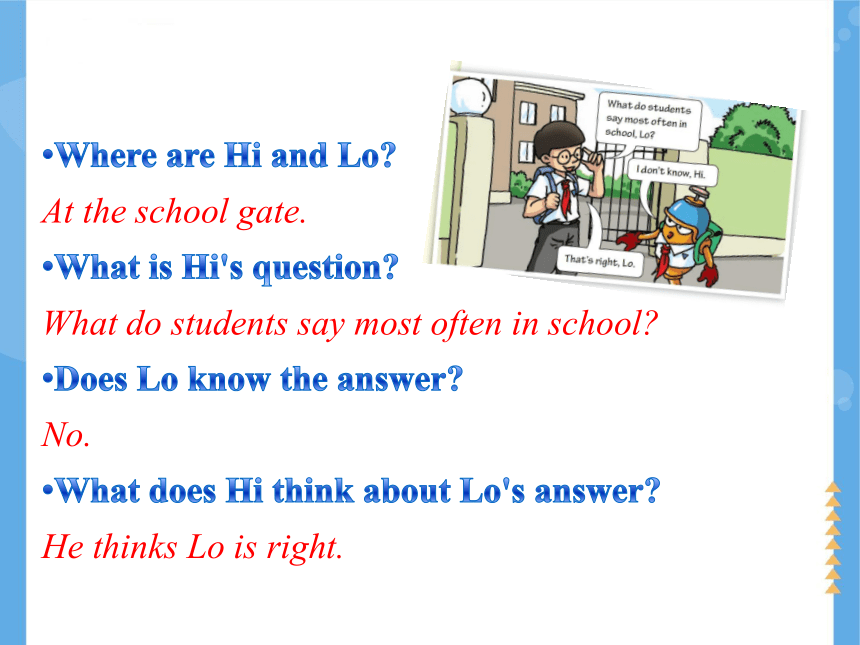
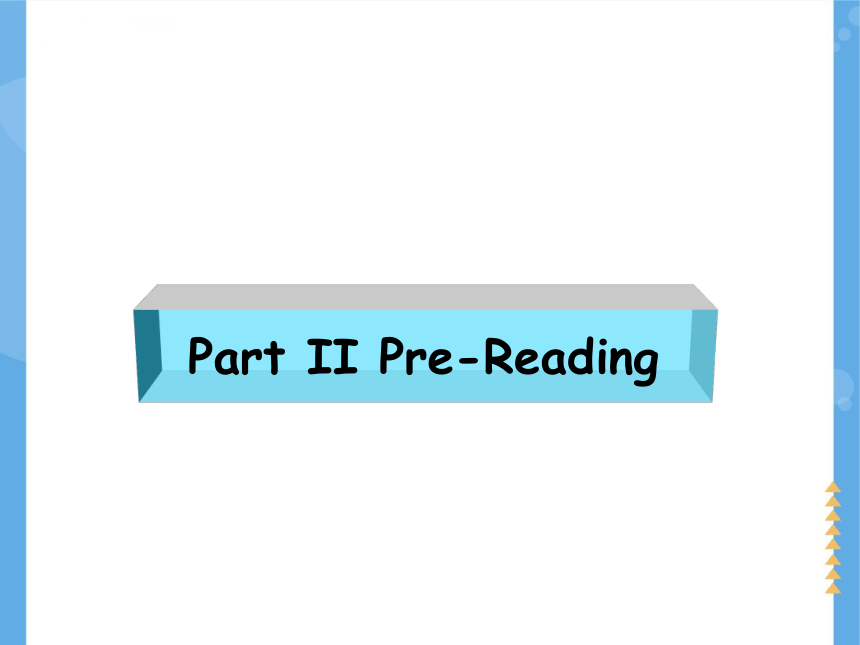
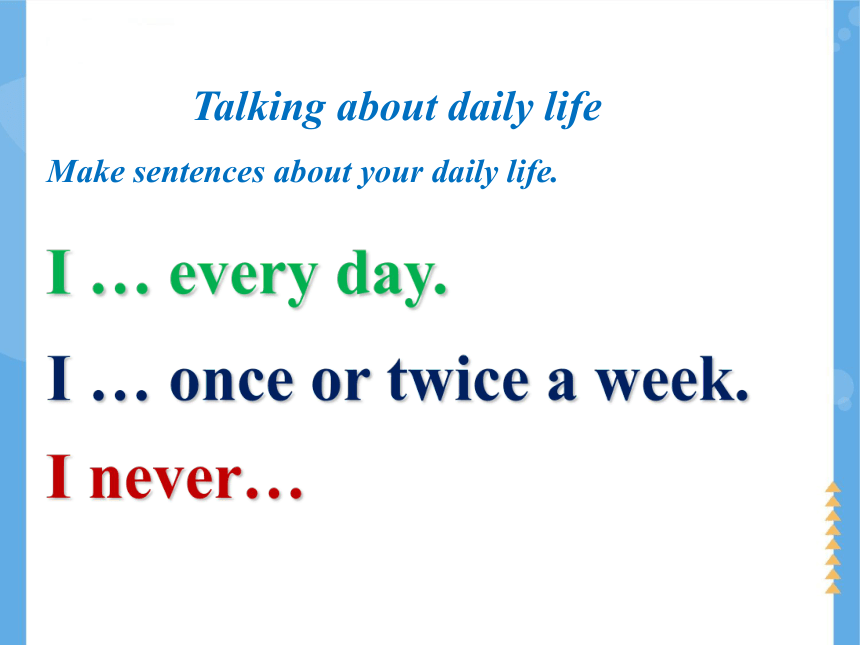
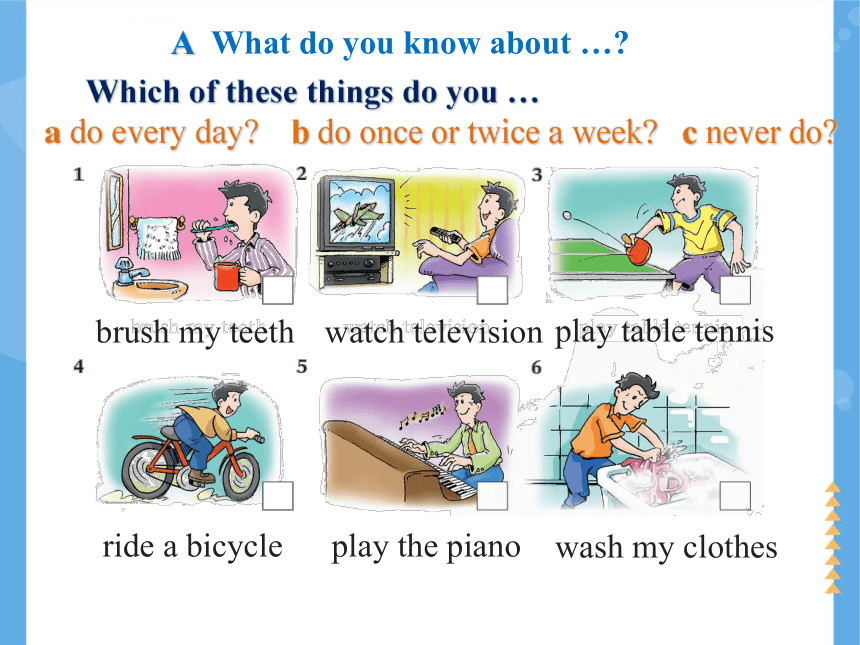
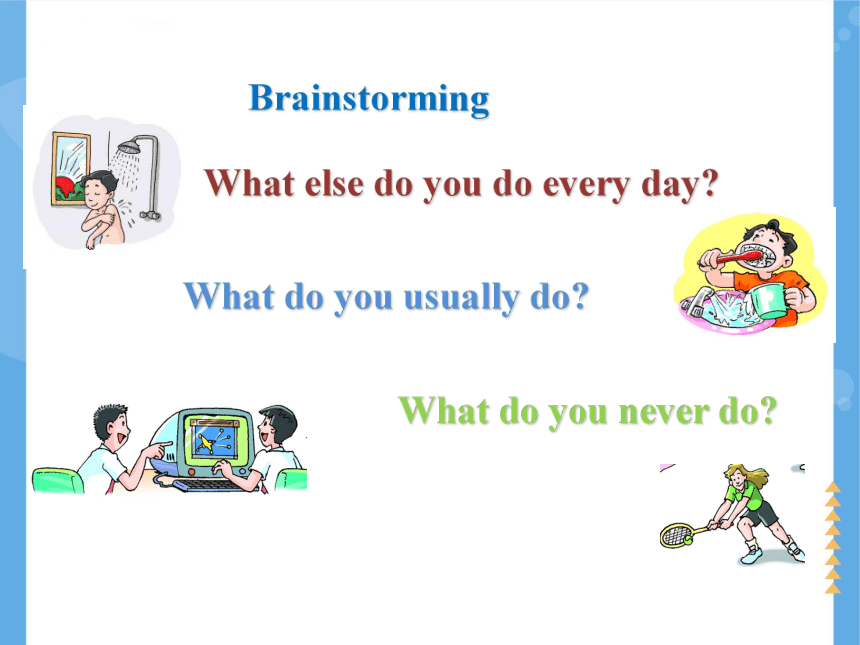
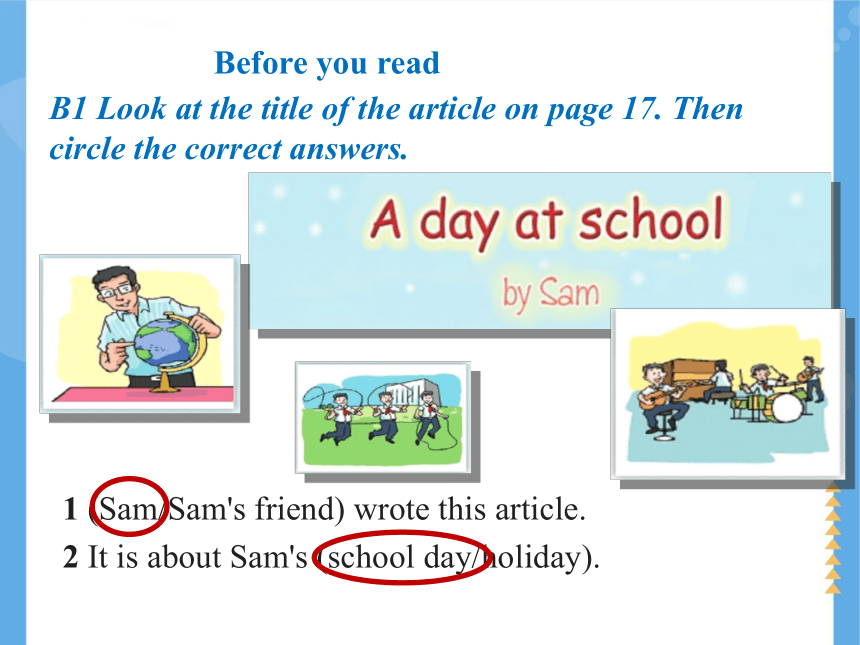
文档简介
(共57张PPT)
Reading
Unit 2 Daily life
1
2
3
4
5
目录
Lead-in
Pre-Reading
While-Reading
Post-Reading
Review
Part I Lead-in
What time is it
eight o'clock
ten twenty-five
twenty-five past ten
three thirty
ten fifty
ten to eleven
half past three
My Daily Life
Things Time
get up at 7:00 am
have breakfast at 8:10 am
go to work at 8:40 am
classes begin at 9:40 am
have lunch at 2:30 pm
go home at 7:50 pm
have dinner at 8:30 pm
watch TV at 10:30 pm
go to bed at 11:00 pm
Getting ready
Let's read a cartoon picture and answer: What's the humor in Hi and Lo's talk
Where are Hi and Lo
At the school gate.
What is Hi's question
What do students say most often in school
Does Lo know the answer
No.
What does Hi think about Lo's answer
He thinks Lo is right.
Part II Pre-Reading
Talking about daily life
I never…
I … every day.
I … once or twice a week.
Make sentences about your daily life.
A What do you know about …
Which of these things do you …
a do every day b do once or twice a week c never do
brush my teeth
watch television
play table tennis
ride a bicycle
play the piano
wash my clothes
Brainstorming
What else do you do every day
What do you usually do
What do you never do
1 (Sam/Sam's friend) wrote this article.
2 It is about Sam's (school day/holiday).
B1 Look at the title of the article on page 17. Then circle the correct answers.
Before you read
B2 Read the first sentence of each paragraph in the article on page 17.
I am a junior high school student.
My school is close to my home, so I always
go to school on foot.
In the morning, we usually study Chinese, Maths and English.
Lunch is from 11:50 a.m. to 12:30 p.m.
I always have a good time at school.
Paragraph 1
Paragraph 2
Paragraph 3
Paragraph 4
Paragraph 5
1 How does Sam go to school
2 What subjects does Sam usually study in the morning
3 How long is the school lunchtime
He goes to school on foot.
He usually studies Chinese, Maths and English in the morning.
The school lunchtime is forty minutes.
Now answer the questions below.
找读课文,并完成以下有关Sam 的信息填写。
Classes start at _________.
Favourite subject: _________
Reason: _________________________________
_________________________________
Morning: Morning break starts at ________ and ends
at ________.
Sam and his friends usually _________.
Lunch time: from _________to __________.
Afternoon: Classes end at __________
Sam takes part in ___________________
with his friends.
8 a.m.
Geography
He enjoys learning about different places
in the world.
9:50 a.m.
10:10 a.m.
play games
11:50 a.m.
12:30 p.m.
3:30 p.m.
the school band practice
Part III While-Reading
Read the text and answer the questions
A day at school
by Sam
I am a junior high school student. I love going to
school.
Paragraph 1 About Sam
Who is Sam
My school is close to my home, so I always go to
school on foot. Classes start at 8 a.m., and I am
seldom late. My favourite subject is Geography. I
enjoy learning about different places in the world.
How does Sam go to school
What is Sam's favourite subject
Paragraph 2 About Sam's school and his favourite subject
In the morning, we usually study Chinese, Maths and
English. We have our morning break at 9:50 a.m.
When the bell rings, I run to the playground with my
best friends Tom and Jack. We often play games.
Break ends at 10:10 a.m. How short it is!
What does Sam usually study in the morning
What does Sam do at the morning break
Paragraph 3 Sam's morning activities
Lunch is from 11:50 a.m. to 12:30 p.m. Afternoon
classes end at 3:30 p.m. Then Tom, Jack and I take
part in the school band practice. We make great
music together.
What does Sam do after school
Paragraph 4 Sam's afternoon activities
I always have a good time at school.
Paragraph 5 Sam always has a good time at school.
1 Sam is a _____ school student.
a primary b junior high c senior high
2 Sam's favourite subject is _____.
a Maths b Geography c English
3 Sam often _____ during the morning break.
a plays with his best friends
b takes part in the school band practice
c reads books
Comprehension exercise
D1 Read the article on page 17 and circle the correct answers.
Vocabulary exercise
C1 Here are some sentences from the article on page 17. Do you know the meanings of the words in italics Circle the correct answers.
1 Classes start at 8 a.m., and I am seldom late.
a often b not often
2 We have our morning break at 9:50 a.m.
a a short time between lessons b a short holiday
3 When the bell rings, I run to the playground with my best friends Tom and Jack.
a makes a sound b is quiet
4 Afternoon classes end at 3:30 p.m.
a stop b begin
5 We make great music together.
a with each other b every day
C2 Sam and Mandy are talking about their daily lives on the plete their conversation with the words and phrases from the box.
More exercise
break
end
on foot
rings
take part in
usually
_
_
_ _
Is your school close to your home, Mandy
Yes, it is, so I go to school (1)________________.
Do you have a lunch (2)___________
Yes. We have one at 11:30 a.m.
When does the school day usually (3)___________
At 3:30 p.m. Most students go home when the bell
(4)___________, but some of us (5)_______________
after-school activities. I enjoy playing basketball.
When do you (6)___________ begin your homework
At about 5:30 p.m.
Sam:
Mandy:
Sam:
Mandy:
Sam:
Mandy:
Sam:
Mandy:
on foot
break
end
rings
take part in
usually
D2 Read the article again and answer the questions below in complete sentences.
1. Why does Sam go to school on foot
Because his school is close to his home.
2. Why does Sam like Geography best
Because he enjoys learning about different places in the world.
3. Who are Sam's best friends
Tom and Jack are his best friends.
4. What does Sam do after school
He takes part in the school band practice after school.
D3 Fill in the table below and then compare your school day with Sam's. Follow the example.
Sam Me
Classes start at 8 a.m.
Morning break 9:50 a.m. - 10:10 a.m.
Lunchtime 11:50 a.m. - 12:30 p.m.
Classes end at 3:30 p.m.
Let's learn the new words and expressions.
New words and expressions
daily adj. 每日的;日常的 p. 15
article n. 文章 p. 15
never adv. 从不 p. 16
table tennis n. 乒乓球 p. 16
ride v. 骑;驾驶 p. 16
usually adv. 通常地 p. 16
so conj. 因此;所以 p. 17
seldom adv. 不常;很少 p. 17
Geography n. 地理 p. 17
break n. 休息 p. 17
bell n. 钟;铃 p. 17
ring v. (使)发出钟声,响起铃声 p. 17
end v. 结束;终止 p. 17
band n. 乐队 p. 17
practice n. 练习 p. 17
together adv. 在一起 p. 17
junior high school 初级中学 p. 17
on foot 步行 p. 17
take part in 参加 p. 17
have a good time 过得愉快 p. 17
首字母填空。
1. Sally is very tired and she wants to have a b______.
2. Our morning classes always e______ at 11:40 in the morning. Then we have lunch.
3. It n______ snows on Hainan Island. It is always hot.
4. Garden City Paper is a d______ newspaper. I read it every day.
5. Class begins again! Do you hear the b______
6. Can you r______ a bicycle
ide
aily
ell
nd
reak
ever
junior high school
on foot
take part in
have a good time
once or twice a week
brush one's teeth
love / enjoy doing ...
morning break
from ... to ...
短语收藏夹
初级中学
步行
参加
过得愉快
每周一两次
刷牙
喜欢做……
早间休息
从……到……
根据中文意思完成句子。
1. 我爸爸从早到晚都在工作。
My father works _____ morning _____ night.
2. 下学期彼得将要去中学读书。他将是一名初中生了。
Peter will study in a middle school next term. He will be a _____ _____ _____ student.
3. 我每周去图书馆一两次。
I go to the library _____ _____ _____ _____ _____.
4. 孩子们在假期通常都过得很愉快。
Children usually _____ _____ _____ _____ in holidays.
from to
junior high school
once or twice a week
have a good time
5. 李叔叔每天走路上班。
Uncle Li goes to work _____ _____ every day.
6. 凯特每年都参加游泳比赛。
Kate _____ _____ _____ the swimming race every year.
7. 伯德每天睡前都会刷牙。
Birde ______ _____ _____ before going to bed every day.
8. 你同桌在早间休息时通常做什么?
What does your deskmate usually do during the
_______ _____
on foot
takes part in
brushes his teeth
morning break
Which of these things do you do once or twice a week
这些事情中有哪些是你每周做一两次的?
once or twice a week 每周一两次,表示频率
一次:once
两次:twice
三次或三次以上:基数词+ times。此时time 是可数名词,意为“ 次数”。
如:three times 三次, six times 六次
Notes (Reading)
提问频率的特殊疑问词为:how often。如:
—你多久锻炼一次?
—每周一两次。
— How often do you do exercise
— Once or twice a week.
根据中文意思完成句子。
1. 我每个月去探望我的祖父母两三次。
I visit my grandparents ____ ____ ____ ____ ____ _______.
twice or three times a
month
I love going to school. 我喜欢上学。
I enjoy learning about different places in the world.
我喜欢了解世界上各个不同的地方。
love 热爱;喜欢,其后面可以跟动词-ing 形式
和动词不定式(to do)
love doing sth 和love to do sth,意为“喜欢做某事”
一般情况下,两个句型可以互换使用。
大多数老人喜欢晚饭后去散步。
Most the elderly love / like going / to go for a walk after
supper.
enjoy 意为“喜欢;享受”
enjoy doing sth 喜欢做某事
我妈妈非常喜欢唱歌。
My mother enjoys singing very much.
选择最佳答案填空。
( )1. At weekends, my sister loves _______, but my
brother likes _______ fishing.
A. swim, go B. swimming, going
C. swim, going D. swimming, go
根据中文意思完成句子。
2. 周末我喜欢做运动。
I _______ _______ exercise at weekends.
love doing
B
My school is close to my home, so I always go to school
on foot.我的学校离我家很近,所以我总是步行去上学。
so 在此处用作连词,意为“因此;所以”
我累了,所以我想休息一下。
I am tired, so I want to have a break.
【温馨提示】在汉语中我们常将“因为”和“所以”搭配使用。在英语中,so 和 because 不能同时出现在一个句子里,即表示原因的句子用了because,表示结果的句子就不能再用so。
on foot 意为“步行”,是固定短语。go to ... on foot 意为“步行去……”,可与 walk to ... 互换使用。如:
我妹妹经常步行去图书馆。
My sister often goes to the library on foot.
= My sister often walks to the library.
选择最佳答案填空。
( )1. There are not any buses here, ____ my father
has to walk home every day.
A. because B. for C. so D. but
( )2. ____ she was ill, ____ she didn't go to
school.
A. Because, so B. Because, /
C. So, because D. So, /
同义句转换。
3. My grandmother walks to the park every afternoon.
= My grandmother ____ ____ the park ____ ____ every afternoon.
goes to on foot
C
B
Then Tom, Jack and I take part in the school band practice.
然后我和汤姆、杰克参加学校乐队的训练。
take part in 意为“参加”,是指参加集体性活动,
如参加讨论、游行、比赛、战斗和庆祝等。如:
约翰参加很多课外活动。
John takes part in many after-school activities.
根据中文意思完成句子。
下周将有大约300 名学生参加学校的运动会。
About 300 students ____ ____ ____ ____ the school sports meeting next week.
will take part in
Part IV Post-Reading
Sam's day at school
Sam is a ____________________. He loves going
to school. Sam's school is ______ to his home, so
he always ____________ on foot. His classes
__________ 8 a.m. His _____________ is Geography.
He ___________________ different places in the world.
junior high school student
close
goes to school
start at
favourite subject
enjoys learning about
Retell the text
In the morning, he usually ______ Chinese, Maths
and English. He ________________ at 9:50 a.m. When
the bell rings, Sam __________________ with his best
friends Tom and Jack. They often __________. Break
__________10:10 a.m. His ______ is usually from 11:50 a.m. to 12:30 p.m. His ______________ end at 3:30 p.m. Then Sam, Tom and Jack take part in _____________________.
They make __________ together. Sam always
_____________ at school.
studies
has morning break
runs to the playground
play games
ends at
lunch
afternoon classes
the school band practice
great music
has a good time
Part V Review
Dictation
daily
article
never
table tennis
ride
usually
so
seldom
Geography
break
每日的;日常的
文章
从不
乒乓球
骑;驾驶
通常地
因此;所以
不常;很少
地理
休息
钟;铃
(使)发出钟声,响起铃声
结束;终止
乐队
练习
在一起
初级中学
步行
参加
过得愉快
bell
ring
end
band
practice
together
junior high school
on foot
take part in
have a good time
一. 根据句意和所给的首字母填空。
1. The students can have a b_____ between two
lessons.
2. When I was doing my homework at home yesterday afternoon, suddenly the door b_____ rang.
3. Starting to speak a foreign language takes lots of p_______.
4. It u______ snows hard in winter in Harbin because its temperature is below 0℃ in winter.
reak
ell
ractice
sually
二. 选择最佳答案填空。
( )1. Most students in my class go to school _____.
A. on feet B. on the foot
C. on foot D. by foot
( )2. --How often do you watch TV
-- ______.
A. At night
B. Twice time a week
C. Twice a week
D. Two time a week
C
C
( )3. I love ______ story-books in my free time.
A. read B. to reading
C. reading D. reads
( )4. There were not any buses then, ______ we
had to walk home.
A. because B. for
C. so D. but
( )5. The little boy doesn't enjoy _____ to school.
A. go B. going
C. to go D. to going
C
C
B
三. 根据中文意思完成句子。
1. 昨天我过得很开心,因为我见到了很多老朋友。
I ____ ___ ____ ____ yesterday because I met a lot of old friends.
2. 初中的课程不算太难。
The courses in ______ ____ ____ are not very difficult.
have a good time
junior high school
3. 我妈妈从早到晚都在做家务。
My mother does the housework ____
morning ____ night.
4. 在早上休息期间,小朋友们一起玩游戏。
The children play games together during the
_______ _____ .
5. 他在课后参加各种各样的活动。
He _____ _____ ____ all kinds of activities after
school.
takes part in
from
to
morning break
Thank you!
Reading
Unit 2 Daily life
1
2
3
4
5
目录
Lead-in
Pre-Reading
While-Reading
Post-Reading
Review
Part I Lead-in
What time is it
eight o'clock
ten twenty-five
twenty-five past ten
three thirty
ten fifty
ten to eleven
half past three
My Daily Life
Things Time
get up at 7:00 am
have breakfast at 8:10 am
go to work at 8:40 am
classes begin at 9:40 am
have lunch at 2:30 pm
go home at 7:50 pm
have dinner at 8:30 pm
watch TV at 10:30 pm
go to bed at 11:00 pm
Getting ready
Let's read a cartoon picture and answer: What's the humor in Hi and Lo's talk
Where are Hi and Lo
At the school gate.
What is Hi's question
What do students say most often in school
Does Lo know the answer
No.
What does Hi think about Lo's answer
He thinks Lo is right.
Part II Pre-Reading
Talking about daily life
I never…
I … every day.
I … once or twice a week.
Make sentences about your daily life.
A What do you know about …
Which of these things do you …
a do every day b do once or twice a week c never do
brush my teeth
watch television
play table tennis
ride a bicycle
play the piano
wash my clothes
Brainstorming
What else do you do every day
What do you usually do
What do you never do
1 (Sam/Sam's friend) wrote this article.
2 It is about Sam's (school day/holiday).
B1 Look at the title of the article on page 17. Then circle the correct answers.
Before you read
B2 Read the first sentence of each paragraph in the article on page 17.
I am a junior high school student.
My school is close to my home, so I always
go to school on foot.
In the morning, we usually study Chinese, Maths and English.
Lunch is from 11:50 a.m. to 12:30 p.m.
I always have a good time at school.
Paragraph 1
Paragraph 2
Paragraph 3
Paragraph 4
Paragraph 5
1 How does Sam go to school
2 What subjects does Sam usually study in the morning
3 How long is the school lunchtime
He goes to school on foot.
He usually studies Chinese, Maths and English in the morning.
The school lunchtime is forty minutes.
Now answer the questions below.
找读课文,并完成以下有关Sam 的信息填写。
Classes start at _________.
Favourite subject: _________
Reason: _________________________________
_________________________________
Morning: Morning break starts at ________ and ends
at ________.
Sam and his friends usually _________.
Lunch time: from _________to __________.
Afternoon: Classes end at __________
Sam takes part in ___________________
with his friends.
8 a.m.
Geography
He enjoys learning about different places
in the world.
9:50 a.m.
10:10 a.m.
play games
11:50 a.m.
12:30 p.m.
3:30 p.m.
the school band practice
Part III While-Reading
Read the text and answer the questions
A day at school
by Sam
I am a junior high school student. I love going to
school.
Paragraph 1 About Sam
Who is Sam
My school is close to my home, so I always go to
school on foot. Classes start at 8 a.m., and I am
seldom late. My favourite subject is Geography. I
enjoy learning about different places in the world.
How does Sam go to school
What is Sam's favourite subject
Paragraph 2 About Sam's school and his favourite subject
In the morning, we usually study Chinese, Maths and
English. We have our morning break at 9:50 a.m.
When the bell rings, I run to the playground with my
best friends Tom and Jack. We often play games.
Break ends at 10:10 a.m. How short it is!
What does Sam usually study in the morning
What does Sam do at the morning break
Paragraph 3 Sam's morning activities
Lunch is from 11:50 a.m. to 12:30 p.m. Afternoon
classes end at 3:30 p.m. Then Tom, Jack and I take
part in the school band practice. We make great
music together.
What does Sam do after school
Paragraph 4 Sam's afternoon activities
I always have a good time at school.
Paragraph 5 Sam always has a good time at school.
1 Sam is a _____ school student.
a primary b junior high c senior high
2 Sam's favourite subject is _____.
a Maths b Geography c English
3 Sam often _____ during the morning break.
a plays with his best friends
b takes part in the school band practice
c reads books
Comprehension exercise
D1 Read the article on page 17 and circle the correct answers.
Vocabulary exercise
C1 Here are some sentences from the article on page 17. Do you know the meanings of the words in italics Circle the correct answers.
1 Classes start at 8 a.m., and I am seldom late.
a often b not often
2 We have our morning break at 9:50 a.m.
a a short time between lessons b a short holiday
3 When the bell rings, I run to the playground with my best friends Tom and Jack.
a makes a sound b is quiet
4 Afternoon classes end at 3:30 p.m.
a stop b begin
5 We make great music together.
a with each other b every day
C2 Sam and Mandy are talking about their daily lives on the plete their conversation with the words and phrases from the box.
More exercise
break
end
on foot
rings
take part in
usually
_
_
_ _
Is your school close to your home, Mandy
Yes, it is, so I go to school (1)________________.
Do you have a lunch (2)___________
Yes. We have one at 11:30 a.m.
When does the school day usually (3)___________
At 3:30 p.m. Most students go home when the bell
(4)___________, but some of us (5)_______________
after-school activities. I enjoy playing basketball.
When do you (6)___________ begin your homework
At about 5:30 p.m.
Sam:
Mandy:
Sam:
Mandy:
Sam:
Mandy:
Sam:
Mandy:
on foot
break
end
rings
take part in
usually
D2 Read the article again and answer the questions below in complete sentences.
1. Why does Sam go to school on foot
Because his school is close to his home.
2. Why does Sam like Geography best
Because he enjoys learning about different places in the world.
3. Who are Sam's best friends
Tom and Jack are his best friends.
4. What does Sam do after school
He takes part in the school band practice after school.
D3 Fill in the table below and then compare your school day with Sam's. Follow the example.
Sam Me
Classes start at 8 a.m.
Morning break 9:50 a.m. - 10:10 a.m.
Lunchtime 11:50 a.m. - 12:30 p.m.
Classes end at 3:30 p.m.
Let's learn the new words and expressions.
New words and expressions
daily adj. 每日的;日常的 p. 15
article n. 文章 p. 15
never adv. 从不 p. 16
table tennis n. 乒乓球 p. 16
ride v. 骑;驾驶 p. 16
usually adv. 通常地 p. 16
so conj. 因此;所以 p. 17
seldom adv. 不常;很少 p. 17
Geography n. 地理 p. 17
break n. 休息 p. 17
bell n. 钟;铃 p. 17
ring v. (使)发出钟声,响起铃声 p. 17
end v. 结束;终止 p. 17
band n. 乐队 p. 17
practice n. 练习 p. 17
together adv. 在一起 p. 17
junior high school 初级中学 p. 17
on foot 步行 p. 17
take part in 参加 p. 17
have a good time 过得愉快 p. 17
首字母填空。
1. Sally is very tired and she wants to have a b______.
2. Our morning classes always e______ at 11:40 in the morning. Then we have lunch.
3. It n______ snows on Hainan Island. It is always hot.
4. Garden City Paper is a d______ newspaper. I read it every day.
5. Class begins again! Do you hear the b______
6. Can you r______ a bicycle
ide
aily
ell
nd
reak
ever
junior high school
on foot
take part in
have a good time
once or twice a week
brush one's teeth
love / enjoy doing ...
morning break
from ... to ...
短语收藏夹
初级中学
步行
参加
过得愉快
每周一两次
刷牙
喜欢做……
早间休息
从……到……
根据中文意思完成句子。
1. 我爸爸从早到晚都在工作。
My father works _____ morning _____ night.
2. 下学期彼得将要去中学读书。他将是一名初中生了。
Peter will study in a middle school next term. He will be a _____ _____ _____ student.
3. 我每周去图书馆一两次。
I go to the library _____ _____ _____ _____ _____.
4. 孩子们在假期通常都过得很愉快。
Children usually _____ _____ _____ _____ in holidays.
from to
junior high school
once or twice a week
have a good time
5. 李叔叔每天走路上班。
Uncle Li goes to work _____ _____ every day.
6. 凯特每年都参加游泳比赛。
Kate _____ _____ _____ the swimming race every year.
7. 伯德每天睡前都会刷牙。
Birde ______ _____ _____ before going to bed every day.
8. 你同桌在早间休息时通常做什么?
What does your deskmate usually do during the
_______ _____
on foot
takes part in
brushes his teeth
morning break
Which of these things do you do once or twice a week
这些事情中有哪些是你每周做一两次的?
once or twice a week 每周一两次,表示频率
一次:once
两次:twice
三次或三次以上:基数词+ times。此时time 是可数名词,意为“ 次数”。
如:three times 三次, six times 六次
Notes (Reading)
提问频率的特殊疑问词为:how often。如:
—你多久锻炼一次?
—每周一两次。
— How often do you do exercise
— Once or twice a week.
根据中文意思完成句子。
1. 我每个月去探望我的祖父母两三次。
I visit my grandparents ____ ____ ____ ____ ____ _______.
twice or three times a
month
I love going to school. 我喜欢上学。
I enjoy learning about different places in the world.
我喜欢了解世界上各个不同的地方。
love 热爱;喜欢,其后面可以跟动词-ing 形式
和动词不定式(to do)
love doing sth 和love to do sth,意为“喜欢做某事”
一般情况下,两个句型可以互换使用。
大多数老人喜欢晚饭后去散步。
Most the elderly love / like going / to go for a walk after
supper.
enjoy 意为“喜欢;享受”
enjoy doing sth 喜欢做某事
我妈妈非常喜欢唱歌。
My mother enjoys singing very much.
选择最佳答案填空。
( )1. At weekends, my sister loves _______, but my
brother likes _______ fishing.
A. swim, go B. swimming, going
C. swim, going D. swimming, go
根据中文意思完成句子。
2. 周末我喜欢做运动。
I _______ _______ exercise at weekends.
love doing
B
My school is close to my home, so I always go to school
on foot.我的学校离我家很近,所以我总是步行去上学。
so 在此处用作连词,意为“因此;所以”
我累了,所以我想休息一下。
I am tired, so I want to have a break.
【温馨提示】在汉语中我们常将“因为”和“所以”搭配使用。在英语中,so 和 because 不能同时出现在一个句子里,即表示原因的句子用了because,表示结果的句子就不能再用so。
on foot 意为“步行”,是固定短语。go to ... on foot 意为“步行去……”,可与 walk to ... 互换使用。如:
我妹妹经常步行去图书馆。
My sister often goes to the library on foot.
= My sister often walks to the library.
选择最佳答案填空。
( )1. There are not any buses here, ____ my father
has to walk home every day.
A. because B. for C. so D. but
( )2. ____ she was ill, ____ she didn't go to
school.
A. Because, so B. Because, /
C. So, because D. So, /
同义句转换。
3. My grandmother walks to the park every afternoon.
= My grandmother ____ ____ the park ____ ____ every afternoon.
goes to on foot
C
B
Then Tom, Jack and I take part in the school band practice.
然后我和汤姆、杰克参加学校乐队的训练。
take part in 意为“参加”,是指参加集体性活动,
如参加讨论、游行、比赛、战斗和庆祝等。如:
约翰参加很多课外活动。
John takes part in many after-school activities.
根据中文意思完成句子。
下周将有大约300 名学生参加学校的运动会。
About 300 students ____ ____ ____ ____ the school sports meeting next week.
will take part in
Part IV Post-Reading
Sam's day at school
Sam is a ____________________. He loves going
to school. Sam's school is ______ to his home, so
he always ____________ on foot. His classes
__________ 8 a.m. His _____________ is Geography.
He ___________________ different places in the world.
junior high school student
close
goes to school
start at
favourite subject
enjoys learning about
Retell the text
In the morning, he usually ______ Chinese, Maths
and English. He ________________ at 9:50 a.m. When
the bell rings, Sam __________________ with his best
friends Tom and Jack. They often __________. Break
__________10:10 a.m. His ______ is usually from 11:50 a.m. to 12:30 p.m. His ______________ end at 3:30 p.m. Then Sam, Tom and Jack take part in _____________________.
They make __________ together. Sam always
_____________ at school.
studies
has morning break
runs to the playground
play games
ends at
lunch
afternoon classes
the school band practice
great music
has a good time
Part V Review
Dictation
daily
article
never
table tennis
ride
usually
so
seldom
Geography
break
每日的;日常的
文章
从不
乒乓球
骑;驾驶
通常地
因此;所以
不常;很少
地理
休息
钟;铃
(使)发出钟声,响起铃声
结束;终止
乐队
练习
在一起
初级中学
步行
参加
过得愉快
bell
ring
end
band
practice
together
junior high school
on foot
take part in
have a good time
一. 根据句意和所给的首字母填空。
1. The students can have a b_____ between two
lessons.
2. When I was doing my homework at home yesterday afternoon, suddenly the door b_____ rang.
3. Starting to speak a foreign language takes lots of p_______.
4. It u______ snows hard in winter in Harbin because its temperature is below 0℃ in winter.
reak
ell
ractice
sually
二. 选择最佳答案填空。
( )1. Most students in my class go to school _____.
A. on feet B. on the foot
C. on foot D. by foot
( )2. --How often do you watch TV
-- ______.
A. At night
B. Twice time a week
C. Twice a week
D. Two time a week
C
C
( )3. I love ______ story-books in my free time.
A. read B. to reading
C. reading D. reads
( )4. There were not any buses then, ______ we
had to walk home.
A. because B. for
C. so D. but
( )5. The little boy doesn't enjoy _____ to school.
A. go B. going
C. to go D. to going
C
C
B
三. 根据中文意思完成句子。
1. 昨天我过得很开心,因为我见到了很多老朋友。
I ____ ___ ____ ____ yesterday because I met a lot of old friends.
2. 初中的课程不算太难。
The courses in ______ ____ ____ are not very difficult.
have a good time
junior high school
3. 我妈妈从早到晚都在做家务。
My mother does the housework ____
morning ____ night.
4. 在早上休息期间,小朋友们一起玩游戏。
The children play games together during the
_______ _____ .
5. 他在课后参加各种各样的活动。
He _____ _____ ____ all kinds of activities after
school.
takes part in
from
to
morning break
Thank you!
